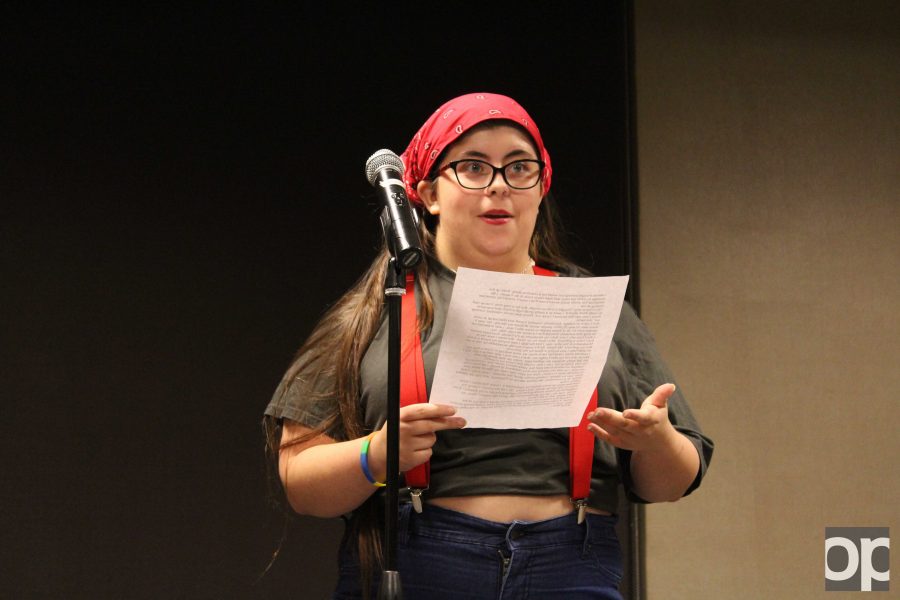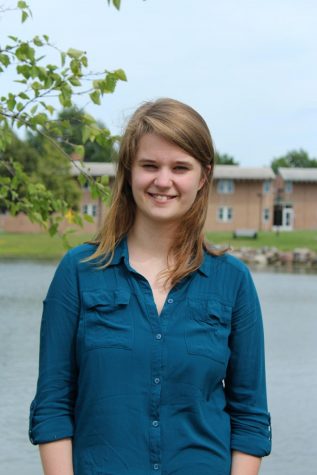Coming out on campus
Cheyanne Kramer performs a monologue at the event.
Ever since 1995, Oakland University has had a clause in its nondiscrimination policy regarding students in same-sex relationships. For 21 years, OU has been a space where gay and lesbian students are protected from discrimination based on their sexuality.
This year, OU unveiled the preferred name policy, which allows students who do not identify with their birth name to have their preferred name displayed on MySail and Moodle.
Policy is important, but it can only do so much. Many people’s mindset is still that the LGBT population is an insignificant minority, but we make up somewhere around 5-10 percent of the general population, according to the National Gay and Lesbian Task Force.
The mindset that the LGBT population is only a minority is a problem. It leads to an internalization that people who are straight and cisgender (those who identify with the gender assigned to them at birth) are the norm.
I performed in the Coming Out Monologues on Oct. 13. It was hosted by the Gay-Straight Alliance in the Oakland Center Gold Rooms. I talked about how people in the LGBT community, like myself, have to come out again and again to the people around us because of the assumption that everyone is straight until proven otherwise.
This mindset does nothing but mark those of us who are part of this community as being “other.” The mindset that our identities are deviant is the exact mindset that allows for hatred, violence and danger targeted directly at the LGBT community to spread across the world.
Earlier this year, individuals celebrating their sexualities, genders and their very beings were gunned down in the Orlando Pulse Massacre. Conversations about the nightclub turned to politics.
Republication presidential nominee Donald Trump tweeted hours after the attack, “When will we get smart, tough, & vigilant?” He criticized President Obama’s call for gun control after the attack, and claimed the attack to be the result of “Radical Islam.”
Nearly one in five of all reported hate-crime cases in 2014 were based on the victims’ sexual orientation, according to The New York Times, and according to Fusion.net, almost one half of all acts of violence against people in the LGBT community go unreported.
With so many deaths and so much violence, it’s easy to see how it can get pretty frustrating to be gay. When my girlfriend and I went to Meadow Brook Hall just over a week ago, without even thinking, I told the woman at the counter that my girlfriend was my friend. I was hesitant to hold her hand.
This mindset that being gay is abnormal isn’t only problematic because it’s held by straight and cisgendered individuals, but it’s internalized by many of us in the LGBT community. Society conditions us to think and act a certain way.
And though being pansexual is part of my identity, part of what makes up the whole “me,” I still sometimes see myself as an outsider. I see myself as others outside of the LGBT community see me.
OU has provided students with resources that many LGBT students and faculty wouldn’t be able to otherwise access, ranging from the ability to tell our own stories in front of our peers during the Coming Out Monologues to simply being protected via official university policy, and from being able to bring a date of any gender to the Meadow Brook Ball to faculty having an LGBTQIA Employee Resource Group to rely on.
But policy isn’t everything, as mentioned before. The mindsets of the people around us are the biggest problems. The university’s creation of policies that include members of the LGBT community and provision of a sense of security for the LGBT community, which isn’t always present in today’s society, makes me not want to leave the accepting campus that is OU.









